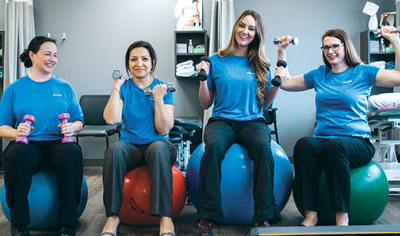Address:
We are offering a variety of virtual care services. Call our clinic to learn more or to book an appointment.
Hours of operation
- Mon:8:30am-2:30pm
- Tue:8:30am-4:30pm
- Wed:8:30am-5:00pm
- Thu:8:30am-4:30pm
- Fri:8:30am-4:30pm
- Sat:Closed
- Sun:Closed
Clinic information
Clinic information
Cupping Therapy
Intramuscular stimulation (IMS)
Pre/Post Natal Care
Functional Dry Needling
Functional Testing
Work Conditioning/Hardening
Foot care
Myofascial Release Therapy
Psychotherapy

Join our team
Apply nowOur team
Our team
-
Occupational TherapistType Occupational TherapistLanguages: English
-
PhysiotherapistType Physiotherapist Book onlineLanguages: English
-
Registered Massage TherapistType Massage Therapist Book onlineLanguages: English, French
-
KinesiologistType Kinesiologist (Regulated) Book onlineLanguages: English
-
PhysiotherapistType Physiotherapist Book onlineLanguages: English, Hindi, Gujarati
-
PhysiotherapistType Physiotherapist Book onlineLanguages: English
Common conditions we treat
Common conditions we treat
-
Dizziness and balance
Dizziness and balance issues can include vertigo, benign paroxysmal positional vertigo (BPPV), nausea, light-headedness, vision issues, motion sensitivity and sensitivity to crowds. They can severely impact quality of life if left untreated. Vestibular rehabilitation can help improve symptoms. -
Frozen shoulder
Frozen shoulder is a progressive condition that often starts with pain in the shoulder joint during basic movement. If the condition is left untreated, pain increases and mobility decreases. Physiotherapists can assess and develop a treatment plan.
-
Hand and wrist pain
Hand, fingers and wrist pain can include symptoms such as tingling, numbness and weakness. The most frequent causes are carpal tunnel syndrome, injury or overuse. An assessment and treatment protocol by a physiotherapist can help.
-
Headaches
Headaches can be caused by a variety of conditions and once assessed by a healthcare professional can be helped with physiotherapy treatment.
-
Knee pain
Knee pain can be caused by bursitis, a torn tendon, ACL tear or injury and overuse. It is most frequently the result of osteoarthritis. Physiotherapy can help speed recovery.
-
Low back pain
Low back pain is one of the most common patient complaints. It can result from arthritis, spinal stenosis, scoliosis, sciatica, injury or overuse. An assessment from a physiotherapist or chiropractor can help provide a diagnosis and treatment plan.
-
Neck pain
Neck pain can result from poor posture, injury like whiplash, infection in the lymph nodes or throat, or a herniated disc. Physiotherapy, massage therapy or chiropractic treatment can help improve mobility and pain.
-
Plantar fasciitis
Plantar fasciitis is one of the most common causes of heel pain. Plantar fasciitis commonly causes stabbing pain, usually occurring with the first steps in the morning. With activity, pain typically subsides, but can return after running or standing up after sitting for a length of time. It most commonly affects people who stand for long periods on hard surfaces, runners, and other high-impact athletes. Treatment from one of our foot care specialists may help to reduce the symptoms and pain.
-
Posture issues
Posture issues, or an excessively curved spine can result from hip, foot or neck/back joint issues, often from sitting improperly at work, standing for long periods, or common foot problems like fallen arches. Chiropractic services, or an assessment from an orthotist/pedorthist may help.
-
Post-surgery
Complications following surgery can include pain, limited mobility, numbness and emotional issues. An assessment from a qualified physiotherapy along with a detailed treatment plan can help to alleviate post-surgery challenges.
-
Rotator cuff injuries
The rotator cuff consists of four muscles that surround the shoulder blade (scapula), and help to hold the arm bone (humerus) in the shoulder capsule. It is easily injured by sport, repetitive use and common daily activity. Physiotherapists can help diagnose and treat symptoms.
-
Sciatica
The sciatic nerve run from the lower back, through the hip and into each buttock before traveling down each leg. Sciatica is the term used to describe the symptoms when there is pressure on the nerve, causing pain in the lower back, hip or buttock. Physiotherapy or chiropractic services can help relieve sciatic pain.
-
Shoulder pain
Shoulder pain can result from bursitis, frozen shoulder, tendonitis or injury and overuse. On rare occasions it may be triggered by illness or infection. A holistic treatment plan that may include physiotherapy, acupuncture, massage therapy or chiropractic services may help.
-
Sports injuries
Sport injuries can occur in weekend warriors to professional athletes, ranging from minor to acute. A treatment plan from physiotherapists and sport medicine physicians can help speed recovery and prevent future injury.
-
Corns
Corns are small, hard areas of skin that tend to develop on the tops, sides, and in-between your toes from friction or pressure. They are painful to touch or when pinched between your toes inside shoes. Corns can be diagnosed and treated painlessly by one of our foot care specialists.
-
Ingrown toenails
These occur when the corner or side of a toenail grows into the soft flesh. These may cause significant pain, tenderness, and swelling along the sides of the nail. It is important to treat these to avoid recurrence and possibly infection around the nail. Ingrown toenails can be treated with several methods, including new innovative painless toenail bracing offered at the clinic.
Coverage options
Virtual care
Virtual Care
 Virtual Care leverages video conference technology to provide services, including online physiotherapy, at a distance. Our video conference platform, built for healthcare professionals, allows you to consult a Lifemark clinician in the comfort of your own home.
Virtual Care leverages video conference technology to provide services, including online physiotherapy, at a distance. Our video conference platform, built for healthcare professionals, allows you to consult a Lifemark clinician in the comfort of your own home.
A clinician can assess or treat you, evaluate your range of motion, recommend exercises, give you advice on pain and pain management and much more.
Services from our specialty programs, such as pelvic health or concussion care, are also available through Virtual Care.
Secure, convenient online services
Virtual Care uses video conference technology to provide services at a distance that are private, secure and easy to use while giving you more flexibility by reducing travel time.
By removing accessibility and mobility barriers, Virtual Care ensures you can receive the care you need. Your privacy is protected through robust policies and safeguards and our clinicians are required to meet the same regulatory and legislative requirements and adhere to their respective Standards of Practice and Code of Conduct as they do for in-person services.
How it works
Before your appointment, you will receive a link to an online appointment session by email or text message. This link will take you to a video conference platform that will allow you to connect with your clinician and discuss your condition with them in real time.
You may be required to review and complete documentation before your appointment, which will be sent to you ahead of time.
For more information about our Virtual Care service, click the button below.






